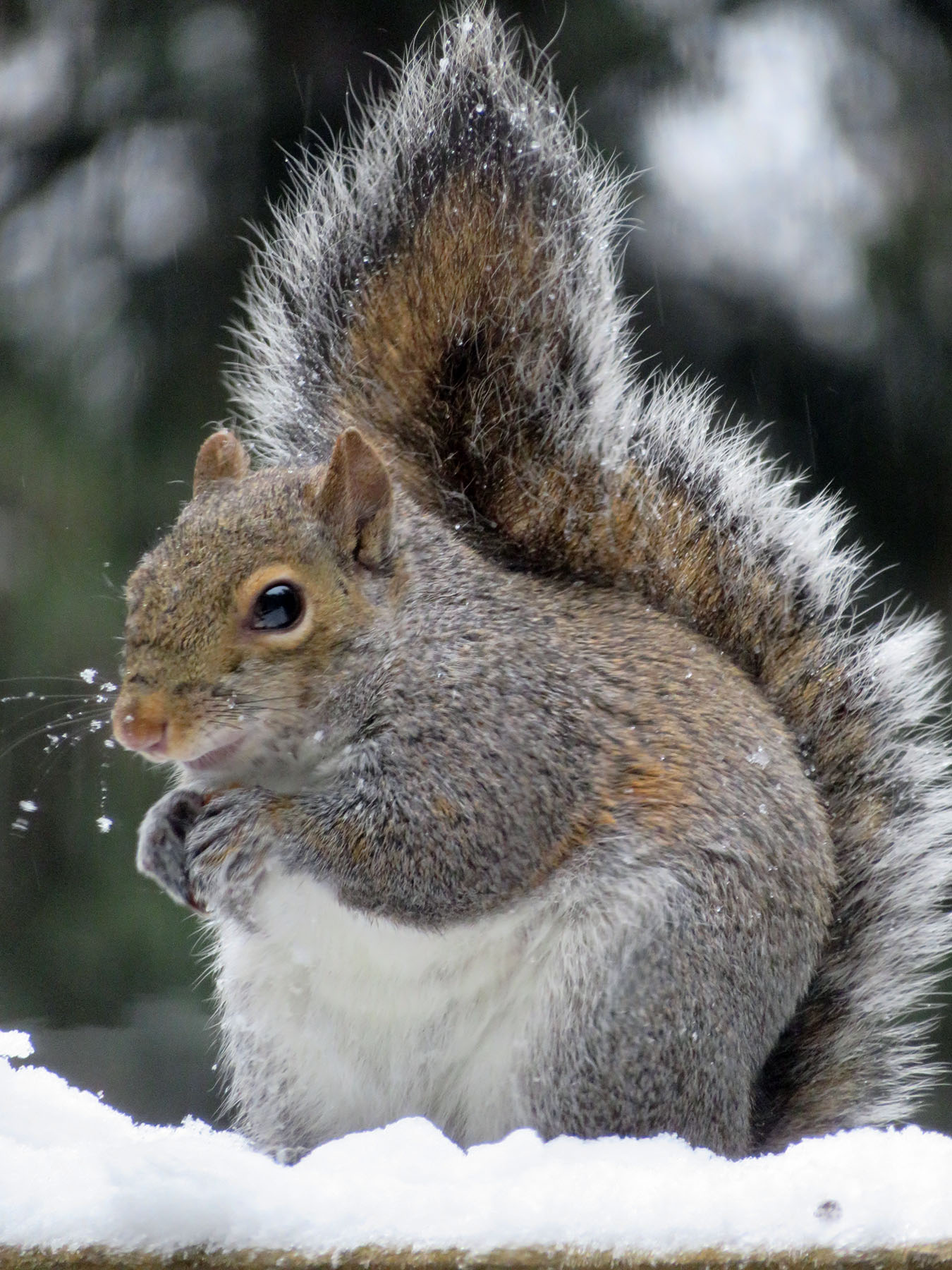Kissed by privilege. Not only do I live in a place surrounded by old-growth trees, but from my bed I look directly onto a balcony that has become a cafeteria for all kinds of creatures during the cold months. The crows visit, as do the thrush and the nuthatches, the juncos and the towhees, some sparrows and the occasional shy chickadee. And then there are the squirrels, scrambling up the side of the house.

We had put seeds and nuts out onto the railing before the snow hit. The squirrels lost no time to dig them all up and either eat them right there or abscond with them to refill empty caches. It brought nature as close to me as possible, a source of considerable joy and distraction. Photographing with my small digital camera – I am not allowed to lift or hold the large one until the incisions are healed – through the window yielded some fun images.


It also made me think about the double-edged sword of the fragmentation of boundaries between human and animal territory with our human incursions into nature’s spaces. On the one hand, you gain so much knowledge if you can observe and research animal behavior of populations close to you. On the other hand, we all know how pandemics are generated if territorial lines are crossed. I feel like Cassandra just mentioning the fact that 7 Russians were the first humans found to be infected with the H5N8 bird flu last week.
Let’s start the week on a more optimistic footing, though. Here are two amazing things about squirrels.

They have not only the capability to listen for and identify predators’ calls, like owls and hawks, predators that could become dangerous to them. They also eavesdrop on the general bird population around them. If other birds continue to chatter unperturbed, the squirrels relax.
“Eavesdropping on alarm calls or eavesdropping on chatter is a cheap and easy way to supplement the information they have access to. Because it’s free. It’s produced by other individuals in the environment. It’s publicly available to any organism that has the cognitive ability to recognize and interpret that information.”
Nifty, but nothing in comparison to what other squirrels’ brains have to offer in the fight against human disease, Alzheimers in particular. Recent research of the brain of arctic ground squirrels revealed some facts that no one ever anticipated.


These critters, at home in Siberia, Alaska and Canada, burrow about a meter under the tundra surface to hibernate for 7 months. During that process, their body temperature plummets, below the freezing point of water!, and their brains stop producing a lot of neural activity. Structurally their neurons shrink and the connections between neurons shrivel away. Think of it as if a tree crown sheds all of its twigs and branches, just leaving a few big limbs intact.

But here comes the amazing part. When the squirrels wake up, they grow back, within only two hours, not just all the synapses lost during hibernation— their brain cells now boast many more links than those of an active squirrel in the spring or summertime. A day later, their brains prune many of these ties, probably recognizing them as superfluous, and so end up in exactly the state before they started hibernation. The details of this process can be found here. The implications for brain plasticity and potential application to brains that have lost a lot of their dendritic connections (dementias) are now explored by scientists around the world.

Maybe my own synapses start firing again, one of these days, emerging from this semi-hibernating interlude. And I will walk in nature again. Which reminds me of one of my favorite poems about walking while stewarding nature’s cycles or mythology, your pick. It was written by former Oregon Poet Laureate Paulann Petersen. The story of Demeter and Persephone really focusses on the eternal cycle of sowing, growth, harvest, withering and dying back, questions as to the nature of human life and death, including the possibility of resurrection from Hades. A mother, Goddess of the harvest, Demeter, carries her tears with her grains, missing her abducted daughter. The pomegranate seeds, mentioned late in the poem, hold life but also the banishment to the underworld, if you remember Persephone’s fate. A temporary excursion into the realm of the dead, just like squirrels in hibernation….

Music by Stravinsky, I’m indulging in the incomparable German version with Fritz Wunderlich.







Carl Wolfsohn
Squirrels rock!
Sara Lee Silberman
Wonderful photos! Interesting material about hibernation. Glad for the posting.
Dave Schaerer
Thanks for the enlightening post. Now I have a little better appreciation of these creatures that multiply faster than rabbits. And your photos were superb!
Nicky
Diese kleinen Biester sind doch verflixt niedlich!!